Money
Saved pennies crash through ceiling
Aug 1947: Clarence Ellsworth had been saving pennies by dropping them through a crack in his attic floor. Finally, when the number of pennies reached 1,672, the weight of the pennies broke through the ceiling and landed in his living room.This raises the question: how much did 1,672 pennies weigh?
According to Wikipedia, pennies issued before 1982 each weighed 3.11 grams since they were made from 95% copper. After 1982, the U.S. Mint substituted a copper-plated zinc penny that weighed less.
3.11 times 1,672 comes out to 5200 grams (rounding up) — or approximately eleven and-a-half pounds.
I'm surprised that was enough to break his ceiling. Perhaps there were other issues, such as water damage, that contributed to the break.
According to an online inflation calculator, $16.72 in 1947 money would be worth $234.18 today. And the repairs would have cost approximately $175 (in today's money).
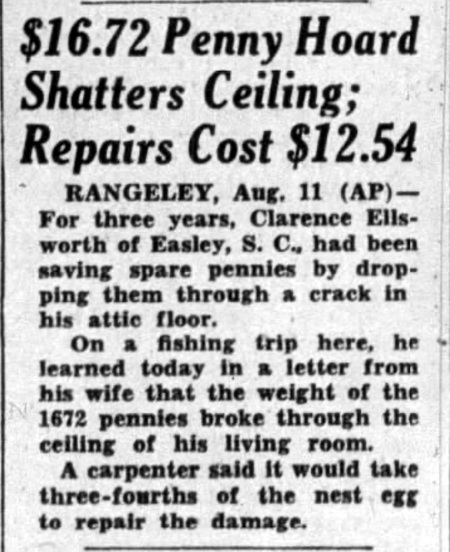
Bangor Daily News - Aug 12, 1947
Posted By: Alex - Tue Apr 16, 2024 -
Comments (2)
Category: Money, 1940s
Coin-Toss Experiment
Is a coin toss truly random? Not according to the "D-H-M model" which proposes that a tossed coin is slightly more likely to land on the same side that it started.To test this model, a team of researchers at the University of Amsterdam arranged for a group of subjects to flip coins a total of 350,757 times. Their conclusion: "the data reveal overwhelming statistical evidence for the presence of same-side bias."
What this means as a money-making strategy:
More info: "FAIR COINS TEND TO LAND ON THE SAME SIDE THEY STARTED: EVIDENCE FROM 350,757 FLIPS"
Posted By: Alex - Thu Apr 11, 2024 -
Comments (5)
Category: Money, Experiments
Thomas Snell’s Millions
Rich people are weird.Before dipping into this story, some perspective on the value of the estate.
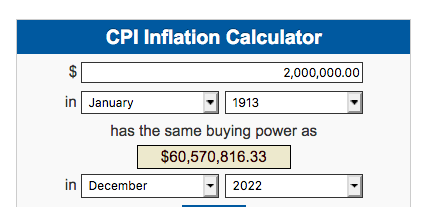

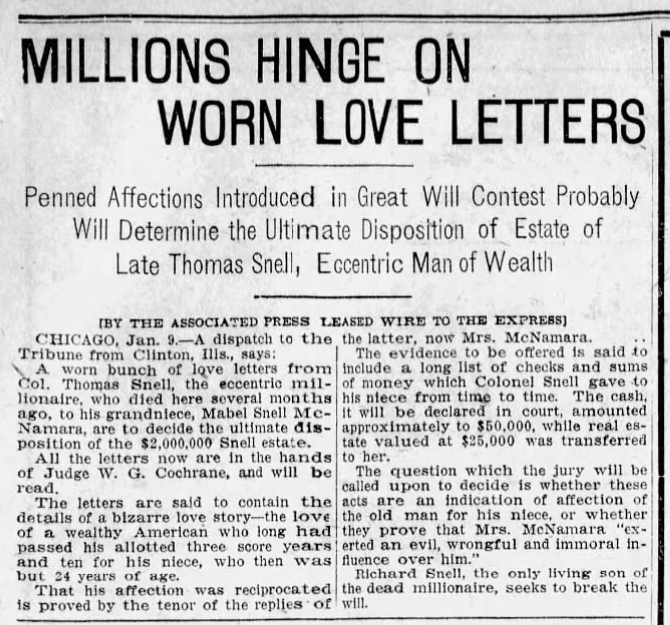



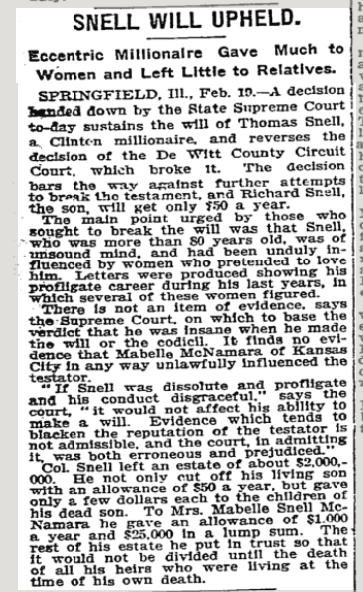
And as final icing on the cake.


Posted By: Paul - Sun Mar 10, 2024 -
Comments (0)
Category: Death, Money, Lawsuits, 1900s, Women
April Fool’s Day Prank Millionaire

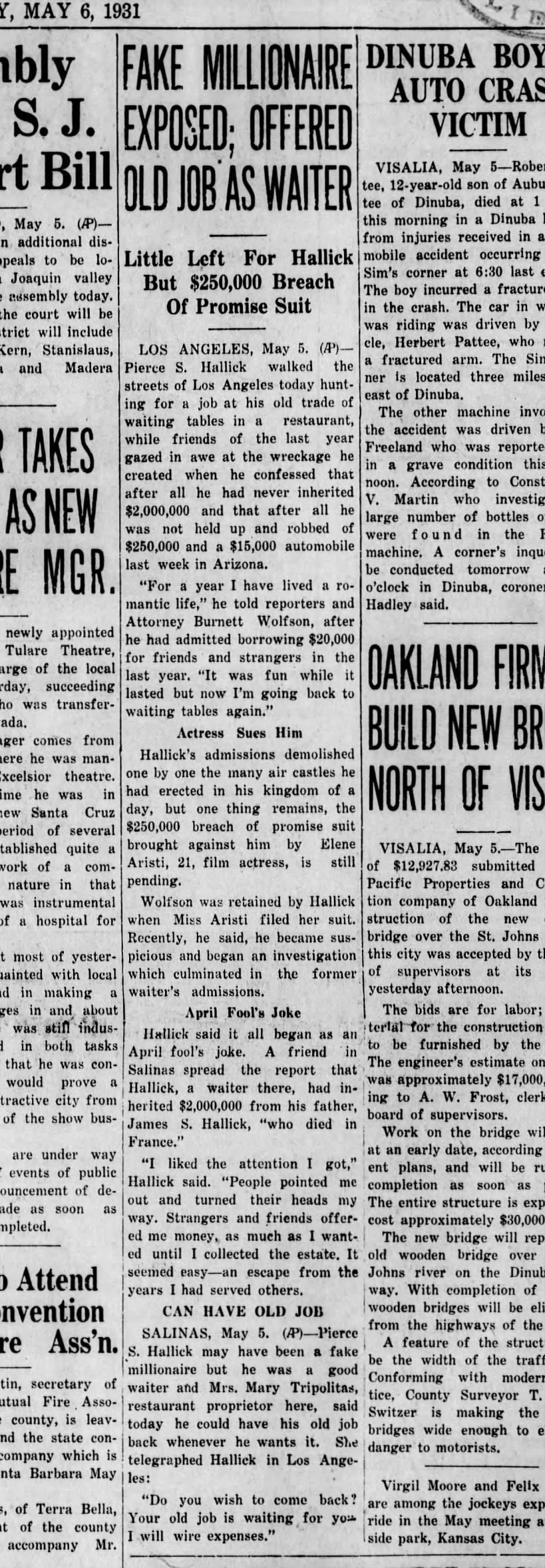


Posted By: Paul - Sun Mar 03, 2024 -
Comments (0)
Category: Hoaxes and Imposters and Imitators, Holidays, Money, Friends, Partners, Co-Workers and Other Associates, 1930s
Ziegfeld Coin Test

Life - Dec 13, 1948
Posted By: Alex - Wed Dec 27, 2023 -
Comments (0)
Category: Money, ShowBiz, 1940s
Whole brain not needed for handling money
Mention to any friends who are bankers or accountants that science has shown they could have a frontal lobotomy and still do their job, and see how they react.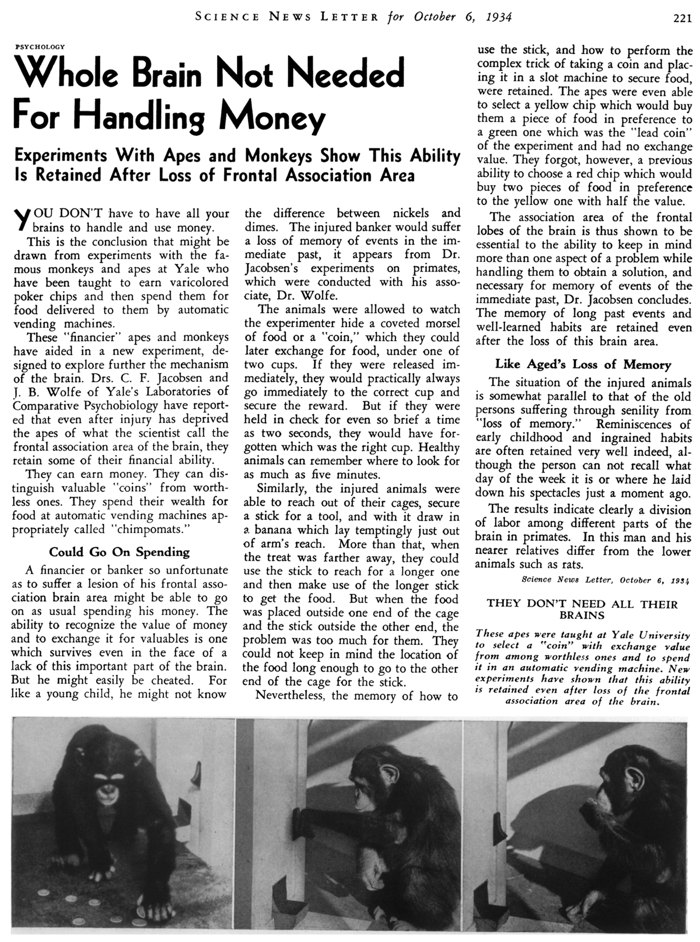
Click to enlarge
Posted By: Alex - Mon Sep 04, 2023 -
Comments (0)
Category: Money, Experiments, Psychology, 1930s
Bank Robber Immobilizing Vestibule
So near as I can interpret this patent, in front of every bank teller's window is erected a revolving-door chamber. The customer--or robber--must enter the chamber, which revolves shut behind him. A good customer is allowed by the clerk's pressing of a switch to exit. The robber is held in place. What could go wrong?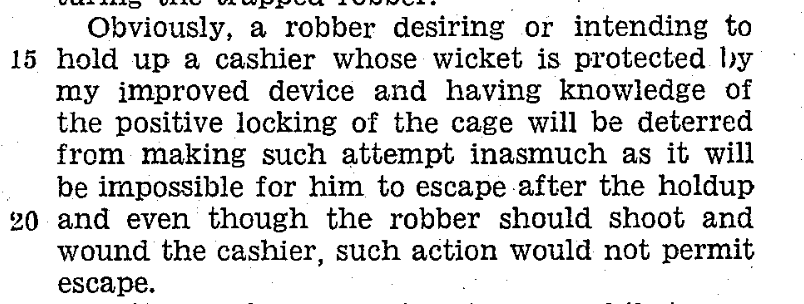
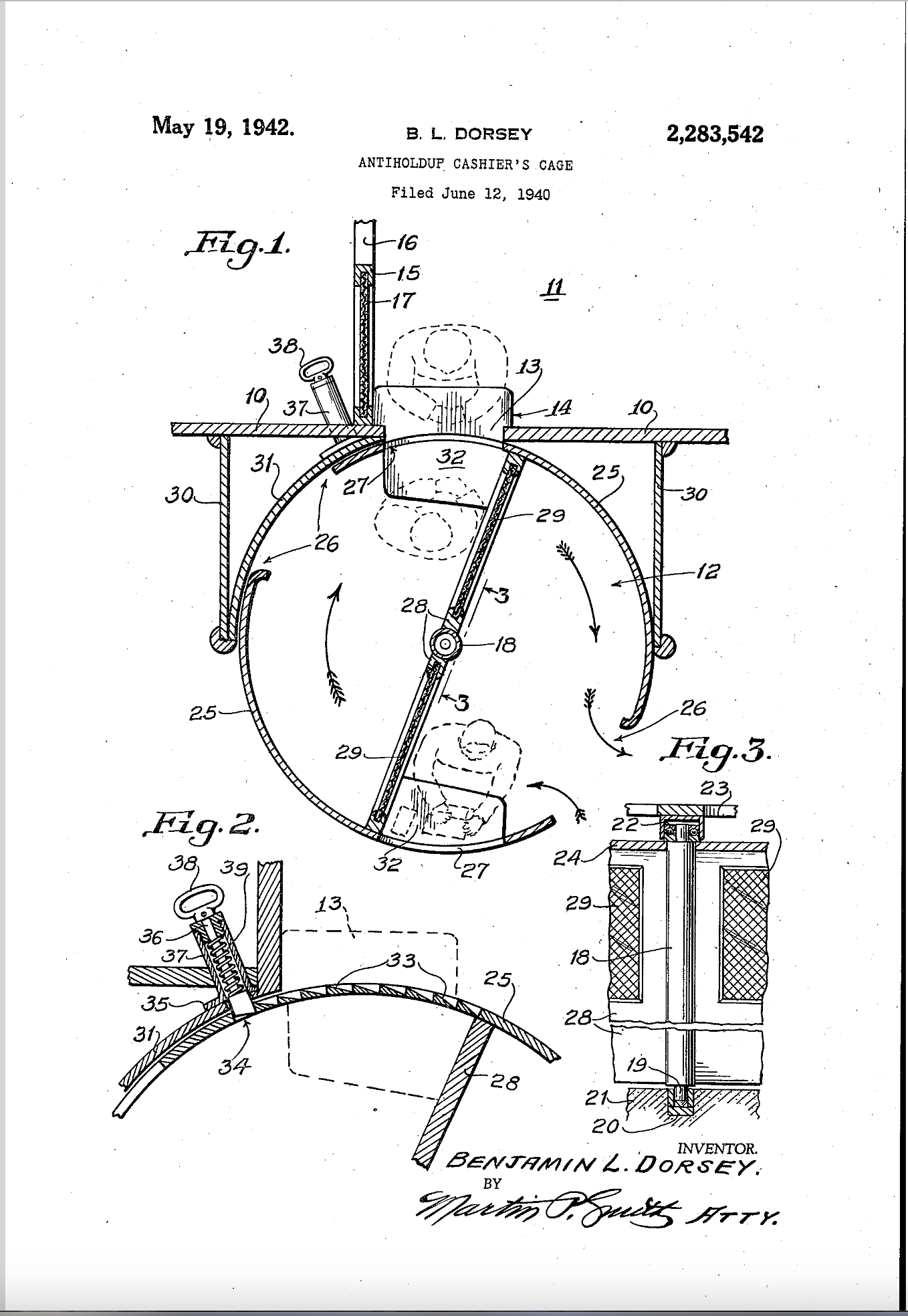
Posted By: Paul - Thu Aug 17, 2023 -
Comments (1)
Category: Crime, Inventions, Patents, Money, Innocent Bystanders, Passersby, Witnesses and Accidental Victims, 1940s
Cash Amnesia
The term "cash amnesia" describes using cash for purchases you don't want to be reminded of later (such as "guilty pleasures and other hard-to-justify purchases"). As opposed to using a credit card, where you'll see the purchases on your statement later.Researchers at the Stanford Graduate School of Business studied whether people really now use cash in this way by analyzing purchases at the Stanford Bookstore. They concluded that "customers were more likely to pay in cash for harder-to-justify items like stuffed plush mascots and Christmas ornaments."
Makes sense to me. I don't often carry cash in my wallet, but when I do it always feels like I've got free money to spend — because anything I buy with it won't bump up that month's credit card bill.
More info: stanford.edu
Posted By: Alex - Sun Aug 06, 2023 -
Comments (2)
Category: Money, Psychology
James Eads How, The Millionaire Hobo
His Wikipedia page.In addition to advocating for hobos, How chose to live as one, even though he had both money and education. He wore a shaggy beard and rough tramplike clothes. It was said that even ordinary hobos looked well dressed compared to How.[3] From about age 25, he traveled around doing hard work for a living.[11] One of How's contemporaries, sociologist Nels Anderson, describes how fully How immersed himself in the hobo lifestyle and how seriously How took his work:
Millionaire that he is, How has not failed to familiarize himself with every aspect of tramp life. He knows the life better than many of the veteran hobos. He has become so thoroughly absorbed in the work of what he describes as organizing the "migratory, casual, and unemployed"...workers that he practically loses interest in himself. He becomes obsessed with some task at times that he will walk the streets all day without stopping long enough to eat.



Posted By: Paul - Sat Jun 10, 2023 -
Comments (1)
Category: Bums, Hobos, Tramps, Beggars, Panhandlers and Other Streetpeople, Eccentrics, Money, Twentieth Century
Shoes sold for peanuts
We've previously posted about cases in which advertisers used the word 'bananas' as slang for dollars, and then had to sell the product (a car and a stereo system) for the appropriate number of bananas.Here's the identical situation, but with peanuts.

Macon Chronicle-Herald - Sep 13, 1949
Posted By: Alex - Wed May 24, 2023 -
Comments (0)
Category: Money, 1940s

| Who We Are |
|---|
| Alex Boese Alex is the creator and curator of the Museum of Hoaxes. He's also the author of various weird, non-fiction, science-themed books such as Elephants on Acid and Psychedelic Apes. Paul Di Filippo Paul has been paid to put weird ideas into fictional form for over thirty years, in his career as a noted science fiction writer. He has recently begun blogging on many curious topics with three fellow writers at The Inferior 4+1. Contact Us |




